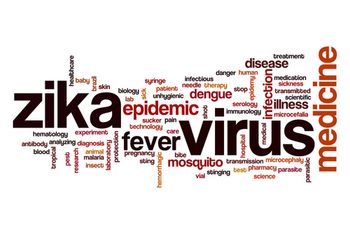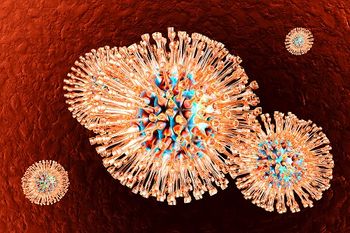
Research presented at the 2017 Annual Pediatric Academic Societies (PAS) meeting examines the similarities between Congenital Rubella Syndrome and Congenital Zika Infection.

Research presented at the 2017 Annual Pediatric Academic Societies (PAS) meeting examines the similarities between Congenital Rubella Syndrome and Congenital Zika Infection.

Findings presented at the 2017 Pediatric Academic Societies Meeting show that this HIV prevention treatment appears to cause loss in bone denisty in young males. However, alternatives may be available.

A research team headed by Carl D’Angio, MD, a physician in the Department of Pediatrics at the University of Rochester Medical Center in Rochester, New York, compare flu vaccine response in PT versus FT infants.

Researchers from the University of Toronto evaluated 82 patients under 18 years of age from Toronto, Ottawa, Montreal, and Quebec.

Physicians call for more education for themselves and the patient before recommending the use of topical microbicides.

At the 2017 Annual Pediatric Academic Societies meeting, Gail Bolan, MD, from the CDC, explained why trends in STD reporting in 2015 may be disturbing.

A study conducted in France found that many pediatrics patients in the western region of the country are dying of vaccine-preventable diseases, and not because they’re not receiving vaccination.

In a research panel at the 2017 Annual Pediatric Academic Societies Meeting, Andres Camacho-Gonzalez, MD, and Craig Wilson, MD, discussed how poorly-controlled HIV infections in adolescents are related to increased risk of other STIs.

Researchers from Montefiore Medical Center presented findings on differential diagnosis of MRSA and Staphylococcus aureus at the 2017 Annual Pediatric Academic Societies (PAS) meeting in San Francisco, California.

At the 2017 Annual EIS Conference, researchers presented findings from a prospective case-control study on acute Zika infection at 9 hospitals in Puerto Rico, as well as on a patient who was paralyzed due to Guillain-Barre Syndrome, unrelated to Zika infection.

Epidemic Intelligence Service officers from the Centers for Diseases Control and Prevention recently released research revealing that cases of Q Fever may be underreported in the United States.

Many women who are infected with hepatitis B (HBV) during pregnancy go untreated, leaving their offspring at risk for a chronic HBV infection.

Could a power law be used to predict food-borne outbreaks and thus help public health agencies better prepare?

More comprehensive molecular and genetic sequencing could help link cases to each other and alert authorities to HIV “clusters” that otherwise might be missed.

The University of Iowa experienced a large mumps outbreak last year, despite almost 100% adherence to 2-dose measles, mumps, rubella (MMR) vaccine schedule, which begs the question, is it time to start recommending a 3-dose schedule?

In populations with high presumptive immunity to measles, the infection can still spread when there is intense contact between patients or high levels of exposure.

Study results presented today at the 2017 66th Annual EIS Conference provided the first statistical evidence for herd protection from the human papillomavirus (HPV) vaccine.

Researchers find that children of parents or caregivers who receive the season flu shot are more likely than others to also be immunized.

Be careful when handling chicks or bunnies this Easter, as they may transmit Salmonella to you or your loved one.

In a recent study, researchers from several institutions found that individuals from North, Central, and South Americas may be at an increased risk of cancer due to Heliobacter pylori strains brought over to the "New World" with European explorers.

A new study has found that young and middle-aged adults who were prescribed long-term antibiotics later had increased risk of colorectal adenoma, a suspected precursor to cancer.

A packaging company in Waco, Texas, has recalled thousands of pounds of brisket out of caution after finding an uncommon strain of Esherichia coli that could cause food poisoning.

WHO representatives warn that a “flare-up” of TB/HIV coinfections coupled with high rates of drug-resistant tuberculosis can threaten progress made towards the elimination of TB.

Research coming in from the University of Texas Health Science Center at Houston shows that when it comes to treating those with C. difficile, frozen and freeze-dried products for Fecal Microbiota Transplantation are nearly as effective as fresh product.

Researchers suggest that patients with eczema should request that their flu shots be administered intramuscularly and not intradermally.

Researchers in China have discovered a troubling case of the presence of a variant of the multidrug-resistant gene MCR-1 in a common strain of Salmonella in a healthy patient.

Researchers have discovered that women who experience active genital herpes infection early in their pregnancy may be more likely to have a child who will later be diagnosed with autism spectrum disorder.

The results of a new study have revealed that older women and African Americans are less likely to get vaccinated against influenza.

Contagion® takes a closer look at how Staphylococcus aureus infections continue to plague professional sports players.

According to the team’s research, published in the Proceedings of the National Academy of Sciences, H. pylori uses a unique biosynthetic pathway to synthesize vitamin K2, which is essential to many vital chemical reactions that keep the organism alive.

Published: December 29th 2016 | Updated:

Published: January 3rd 2017 | Updated:

Published: January 6th 2017 | Updated:

Published: January 6th 2017 | Updated:

Published: January 7th 2017 | Updated:

Published: January 10th 2017 | Updated: